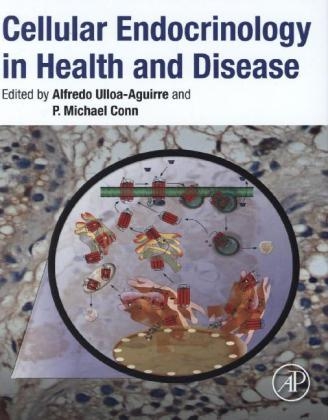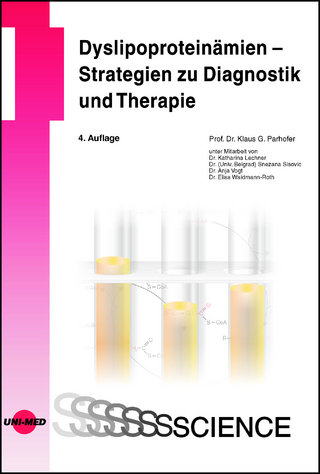
Cellular Endocrinology in Health and Disease
Academic Press Inc (Verlag)
978-0-12-408134-5 (ISBN)
- Titel erscheint in neuer Auflage
- Artikel merken
Providing content that crosses disciplines, Cellular Endocrinology in Health and Disease details how cellular endocrine function contributes to system physiology and mediates endocrine disorders. A methods section proves novel and useful approaches across research focus that will be attractive to medical students, residents, and specialists in the field of endocrinology, as well as to those interested in cellular regulation. Editors Alfredo Ulloa-Aguirre and P. Michael Conn, experts in molecular and cellular aspects of endocrinology, deliver contributions carefully selected for relevance, impact, and clarity of expression from leading field experts.
Alfredo Ulloa-Aguirre, M.D., D.Sc. is senior scientist in the Research Center for Population Health at the National Institute of Public Health and Professor ofthe National University of Mexico (UNAM), where he heads the Research Support Network of the National Institutes of Health in Mexico City. He received hisgraduate training in internal medicine and reproductive endocrinology at the National Institute of Medical Sciences and Nutrition SZ and earned the Doctoral degree in Medical Sciences from the UNAM. He received postdoctoral training at the University of Pennsylvania, Philadelphia PA, and has been visiting scientist at the Oregon National Primate Resarch Center, OHSU, Beaverton OR, and the Institut National de la Recherche Agronomique, in Tours, France (Le Studium Scientist). He is currently a member of the Studium Consortium for Research and Training in Reproductive Sciences (sCORTS, Le Studium, Orléans, France). An internationally recognized physician-scientist, Dr Ulloa-Aguirre has developed programmes in both clinical and basic research. His laboratory focuses on the structure-function relationship of gonadotropins and gonadotropin receptors as well as on the gonadotropin-releasing hormone receptor, with particular emphasis on the factors and mechanisms that control intracellular trafficking of these receptors. He is the author or co-author of over 165 research publications and several book chapters. P. Michael Conn is the Senior Vice President for Research and Associate Provost, Texas Tech Health Sciences Center. He is The Robert C. Kimbrough, Professor of Internal Medicine and Cell Biology/Biochemistry. He was previously Director of Research Advocacy and Professor of Physiology and Pharmacology, Cell Biology and Development and Obstetrics and Gynecology at Oregon Health and Science University and Senior Scientist of the Oregon National Primate Research Center (ONPRC). He served for twelve years as Special Assistant to the President and Associate Director of the ONPRC. After receiving a B.S. degree and teaching certification from the University of Michigan (1971), a M.S. from North Carolina State University (1973), and a Ph.D. degree from Baylor College of Medicine (1976), Conn did a fellowship at the NIH, then joined the faculty in the Department of Pharmacology, Duke University Medical Center where he was promoted to Associate Professor in 1982. In 1984, he became Professor and Head of Pharmacology at the University of Iowa College of Medicine, a position he held for eleven years. Conn is known for his research in the area of the cellular and molecular basis of action of gonadotropin releasing hormone action in the pituitary and therapeutic approaches that restore misfolded proteins to function. His work has led to drugs that have benefitted humans and animals. Most recently, he has identified a new class of drugs, pharmacoperones, which act by regulating the intracellular trafficking of receptors, enzymes and ion channels. He has authored or co-authored over 350 publications in this area and written or edited over 200 books, including texts in neurosciences, molecular biology and endocrinology. Conn has served as the editor of many professional journals and book series (Endocrinology, Journal of Clinical Endocrinology and Metabolism, Endocrine, Methods, Progress in Molecular Biology and Translational Science and Contemporary Endocrinology). Conn served on the National Board of Medical Examiners, including two years as chairman of the reproduction and endocrinology committee. The work of his laboratory has been recognized with a MERIT award from the NIH, the J.J. Abel Award of the American Society for Pharmacology and Experimental Therapeutics, the Weitzman, Oppenheimer and Ingbar Awards of the Endocrine Society, the National Science Medal of Mexico (the Miguel Aleman Prize) and the Stevenson Award of Canada. He is the recipient of the Oregon State Award for Discovery, the Media Award of the American College of Neuropsychopharmacology and was named a distinguished Alumnus of Baylor College of Medicine in 2012. Conn is a previous member of Council for the American Society for Cell Biology and the Endocrine Society and is a prior President of the Endocrine Society, during which time he founded the Hormone Foundation and worked with political leadership to heighten the public’s awareness of diabetes. Conn’s students and fellows have gone on to become leaders in industry and academia. He is an elected member of the Mexican Institute of Medicine and a fellow of the American Association for the Advancement of Science. He is the co-author of The Animal Research War (2008) and many articles for the public and academic community on the value of animal research and the dangers posed by animal extremism. His op/eds have appeared in The Washington Post, The LA Times, The Wall Street Journal, the Des Moines Register, and elsewhere. Conn consults with organizations that are influenced by animal extremism and with universities and companies facing challenges from these groups.
1. Thyroid hormone receptors and their role in cell proliferation and cancer" 2. The molecular cell biology of anterior pituitary cells 3. Sensing calcium levels –the biology of the parathyroid cell 4. The biology of pituitary stem cells 5. The Na(+)/I(-) symporter and biosynthesis of thyroid hormones 6. The FSH signaling network in Sertoli cells 7. Epigenetics and pituitary cell growth 8. Epigenetics and metabolic abnormalities 9. Unraveling the mechanisms underlying GnRH pulse generation: test of the proposed role for KNDy neurons 10. Proteomics and Cellular Signaling 11. Transcriptome analysis of adrenocortical cells in health and disease 12. Bone as an endocrine organ 13. The control of steroidogenesis of adrenocortical cells 14. The adipocyte as endocrine target 15. Insulin secreting cell lines: potential for research and diabetes therapy 16. The architecture of human pancreatic islets as revealed by molecular imaging 17. Computational models to decipher cell signaling pathways 18. The regulation of theca cell-granulosa cell dialogue by endocrine and paracrine factors 19. Unraveling the mechanism of action of the GnRH pulse generator: the TAC3/TAC3R-dinorphin-Kiss1/Kiss1R neuronal connection 20. Endocrinology of the single cell 21. Altering aberrant intracellular trafficking of cell surface membrane receptors by pharmacological chaperones 22. Deiodinases: taylors that suit intracellular thyronine demands 23. Micro RNAs and non-coding RNAs in beta–cell function
| Verlagsort | San Diego |
|---|---|
| Sprache | englisch |
| Maße | 191 x 235 mm |
| Gewicht | 1070 g |
| Themenwelt | Medizinische Fachgebiete ► Innere Medizin ► Endokrinologie |
| Studium ► 1. Studienabschnitt (Vorklinik) ► Biochemie / Molekularbiologie | |
| ISBN-10 | 0-12-408134-7 / 0124081347 |
| ISBN-13 | 978-0-12-408134-5 / 9780124081345 |
| Zustand | Neuware |
| Haben Sie eine Frage zum Produkt? |
aus dem Bereich



